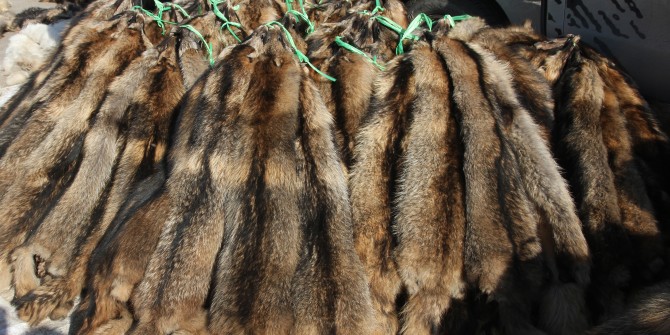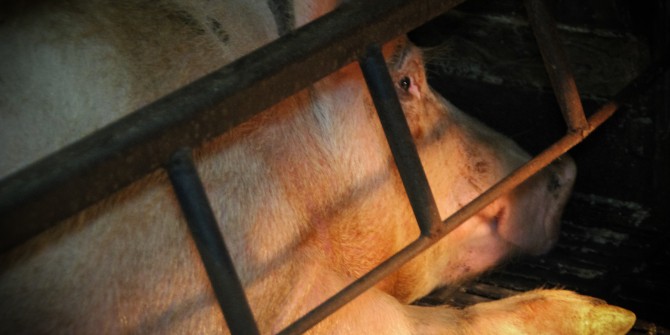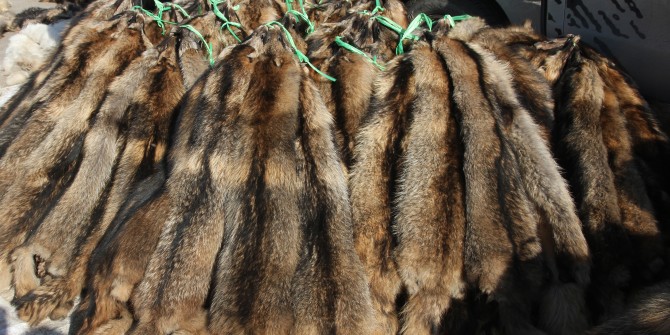China is unlikely to stop farming livestock intensively. But the country does have an opportunity to crack down on the farming of wild animals for food, fur and medicine, says Amanda Whitfort (University of Hong Kong) – and banning it would reduce the risk of another pandemic.
Amanda Whitfort is responding to Jonathan’s Birch’s LSE Festival talk, Humans, Animals and Pandemics: What Needs to Change? Join in the discussion below.
Jonathan Birch is right: the time has come for government policy makers to rethink their support for the meat industry and encourage consumers to eat less meat. In reality, however, not all governments will concur.
China is currently the largest producer of livestock products in the world, and nearly all its produce is consumed domestically. A desire for food security and increased rural employment underscore the Chinese government’s support for further intensification of agricultural production. In the context of China, Birch’s suggestions are doomed to fail.
Fortunately, there are other ways to help reduce the risk of another pandemic. In China, this should include banning the farming of high-risk species for food and other purposes, and ensuring the welfare of those species that continue to be farmed.

For years, public health experts have been warning of the risks that intensive farming poses to animal and consequently human health. Recognising that health and welfare are inextricably linked, the World Organisation for Animal Health (OIE) provides guidance on how to control the risk of zoonotic disease through positive animal welfare standards for the most widely-farmed domestic species. However, little attention has been paid globally to the farming of wild species, which are bred not only for food but also for medicine, the pet trade, for decoration (including fur), exhibition and scientific use.
In the wake of COVID-19, the Chinese government acted quickly to impose a ban on the sale of many wild species for food. That was an important first step in controlling the risk of further pandemics. But not unexpectedly, the breeding, transport and sale of animals for purposes other than food has not been affected by the domestic ban. China’s annual output from wildlife breeding was estimated to exceed 520 billion yuan at the end of 2016. The Chinese government is unlikely to undermine an industry it has not only actively promoted for decades, but which employs many of China’s rural poor, often working in family businesses. To reduce the number of workers breeding animal for food, compensation has been offered to those who voluntarily pivot to farming wild species which can be used for other supported purposes, such as medicine. The masked palm civet, for example, is farmed in China not only for food, but also for fur and use in traditional Chinese medicine.
But farming high-risk species like these is dangerous, no matter what its purpose. In 2003 the masked palm civet was linked by researchers in Hong Kong with the SARS coronavirus. SARS is thought to have originated in insectivorous bats, then spread through civets sold at live animal markets to humans. Studies of masked palm civets infected with SARS linked the stressful conditions the animals endured in wildlife markets to the spread of the disease. Stress from transport, close confinement in captivity and poor animal welfare standards are all known to contribute to immunosuppression and increase the risk of zoonotic disease.
While the farming of wild animals for medicine is most common in Asia, wild animals are bred for a multitude of purposes globally. The continued breeding of high-risk wild species for any purpose presents a significant global risk. That risk is increased when there are insufficient laws to promote the welfare of animals in farming, transport and at market. China currently has no national law to promote the welfare of animals. The country is updating its disease control laws to prevent the risk of further epidemics, but the amendments being discussed make no provision for animal welfare controls which can provide important safeguards for animals when disease controls fail. That omission requires urgent attention.
This post represents the views of the author and not those of the COVID-19 blog, nor LSE.






1 Comments